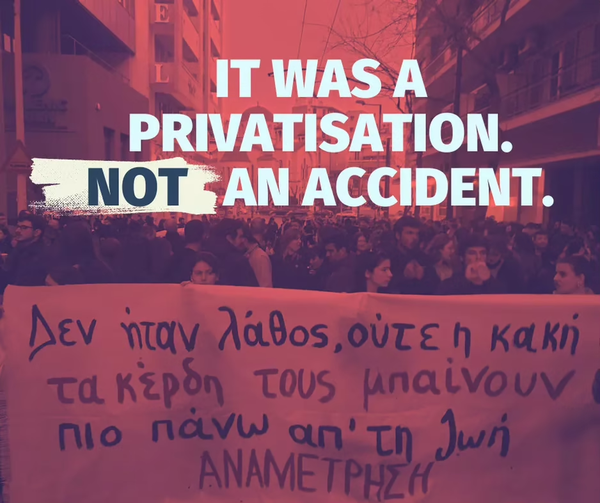
by Stelios Foteinopoulos (International Affairs Section of Anametrisi, Greece)
We publish a text by Stelios from the Greek collective Anametrisi that talks about the protests happening in Greece in the last weeks following a train “accident” that killed 57 people. The reaction to this event prompted the eruption of a large movement that goes well beyond the “accident” itself and connects with years of struggles in Greece and with social tensions across Europe. The protesters denounced the accident as a side-effect of the long-lasting process of privatisation triggered by the 2015 debt crisis and of the attack to the living conditions of millions of people caused by neoliberal policies. As Stelios explains, the protests happen in a moment when massive demonstrations and strikes are taking place in France against the pension reform, while a strike wave is hitting the UK and Germany where hundreds of thousands workers are mobilizing for higher wages in face of inflation. Our task is to understand and manifest the interconnections between these struggles that share a refusal of paying with one’s own life, time and wage the unruly disorder that the champions of war politics all over us have created. How long are they going to be in their capacity to force decisions and sell a democracy that fosters war and that is only the tool to enforce neoliberal policies that kill and threaten millions of people? We need to create links between the struggles and to develop a common reading of the situation. This is more necessary than ever if we want to pour over those in power all the anger that is running throughout Europe and beyond.
A river of anger is sweeping Greece after the loss of 57 people due to a tragic head-on train collision in Tempi, Greece. The train crash was one of Europe’s deadliest rail tragedies in history, and it sparked anger, confusion and turmoil in greek society.
According to the reports, the collision was caused by a combination of factors linked to a lack of safety regulations in place, inadequate supervision and the failure to comply with basic guidelines, including a telemanagement system, that allowed a spontaneous human error to ignite the tragedy.
Despite the media framing, most people in Greece are not willing to put up with the manufactured narrative. They know this tragedy was a direct result of long-term state policies and chronic failures to sustain public services. After all, the railway workers through their unions, have long warned against the dangers linked to the railways’ operation, maintenance, security and modernisation. The employees had flagged how the 2017 privatisation of services orchestrated by the SYRIZA administration and implemented by the current conservative Government had left services understaffed and without proper funding since the most profitable part of the organisation (train services) was given away for a small price to an Italian State company which would then be paid back as an annual contribution from the greek governments to them. Even the National Transparency Authority, a major independent institution, had issued warnings to the Government asking for immediate support measures as the train services have been conducted despite the danger posed by the lack of safety systems. All in all, this tragedy summarized the neoliberal obsession with privatising the profitable sectors of the state, especially when these sectors are a natural monopoly. From this point of view, the tragedy in Tempi is a typical example of a state-corporate crime, similar to which there are many in an international context. Neoliberalism, as an expression of modern capitalism, constantly produces such phenomena of exploitation and depreciation of public goods with disastrous results for the social majority.
To deal with the overwhelming evidence being brought to light, the Government and friendly media continuously pursue this line of shifting the responsibility to the working people in Greece who are supposedly “part of the problem” and the station manager who was in charge on the night of the event. However, the well-organised effort orchestrated by Prime Minister Mitsotakis and leading conservative journalists to drive away the public debate from the available evidence has failed big.
To respond to the loss of 57 people, the demonstrations have become so popular that recent polls showed that about 30% of the total population had joined them at least once, and that the key factors driving people to demonstrate are the demand for transparency and justice.
The enormous demonstrations across several cities and towns in Greece have brought on the streets striking workers hand in hand with students and ordinary people who, for a 4th consecutive week, have successfully managed to break the veil of silence imposed by the Government and the establishment media. The people in Greece are not prepared to be silenced. The systemic failure to support public services and the funding collapse caused by privatisation don’t allow space for a cover-up. The scale of injustice enables a public discussion about the role of public control, the reality that privatisations impose on peoples’ lives, and the responsibility shared by all the political parties who have spent time in office. Political parties that, despite good or not-so-good intentions, all designed and implemented harsh neoliberal policies targeting public services, often imposed by the EU but never scrutinised by them.
Oh, yes. The European Union. Brussels directorates have been pushing for the privatisation of transport in Greece since 2013. But it took only a year for SYRIZA to lead the talks with Ferrovie dello Stato Italiane Group in 2017, and conclude the sell-out for a ridiculous amount of money (45 million euros), while it is subsidised 50 million euros a year by the Greek state for all routes and even the Athens line -Thessaloniki was treated as “barren”. New Democracy and the socialists supported this agreement as well as the entire package of privatisations in the last decade: Airports, ports, trains, and national roads.
People didn’t become angry overnight.
The rightwing party (ND), which has campaigned continuously on the narrative of “security” more than anyone, has admitted that peoples’ lives are constantly being gambled and played with dice. The same thing happened during the pandemic, when the Government prioritised lockdowns by setting up a police state while the country’s public hospitals were left abandoned, understaffed and without the necessary funding. The same thing also happened with environmental crimes, such as the devastating summer wildfires, when whole communities were left alone and hopeless to fight massive blazes in some of the greatest environmental disasters in the European region. The people in Greece are experiencing consecutive and intersecting crises caused by neoliberal governments that have been incapable of protecting and defending the rights of the ordinary people. The scale of the political vacuum today is great enough that there is no other way for young people than to massively take on the streets, not only to send a message of anger but to practically ask for justice.
The recent turmoil in Greece coincides with the french demonstrations against the pension reform and the strikes in the UK and Germany, where the unions are giving a massive fight against the cost of living crisis. What is critical now is the woven fabric that interconnects these struggles and builds spaces where social and political movements can renew the debate with new questions and discuss new strategies. After all, the wave of anger across Europe must continue and strengthen with further big dates of coordinated actions. Now is the time for working people to speak out and demand a better life.





